HIST 2020: The Assassination of Abraham Lincoln: A Historical Analysis
VerifiedAdded on 2022/08/26
|6
|1440
|28
Essay
AI Summary
This essay provides a detailed account of the assassination of Abraham Lincoln, the 16th President of the United States. It explores Lincoln's presidency, his leadership during the American Civil War, and his efforts to abolish slavery. The essay delves into the events leading up to the assassination, including the role of John Wilkes Booth and his motives. It examines the conspiracy behind the assassination, the search for Booth, and the aftermath of the tragic event. The essay also covers the impact of Lincoln's death and his enduring legacy as a national martyr and champion of human liberty, referencing key historical figures and events, and adhering to the HIST 2020 writing assignment requirements, including source material and citation style.
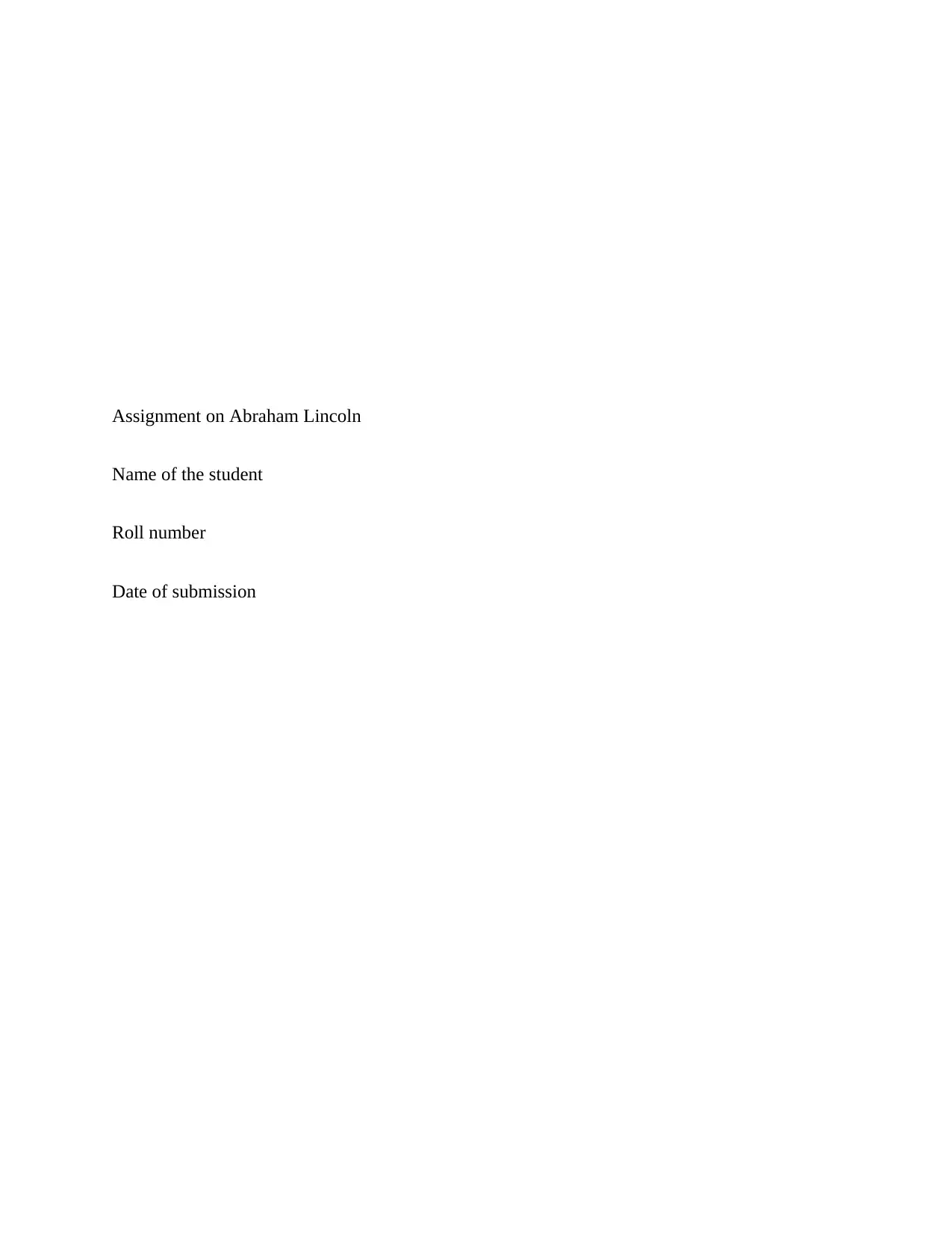
Assignment on Abraham Lincoln
Name of the student
Roll number
Date of submission
Name of the student
Roll number
Date of submission
Paraphrase This Document
Need a fresh take? Get an instant paraphrase of this document with our AI Paraphraser
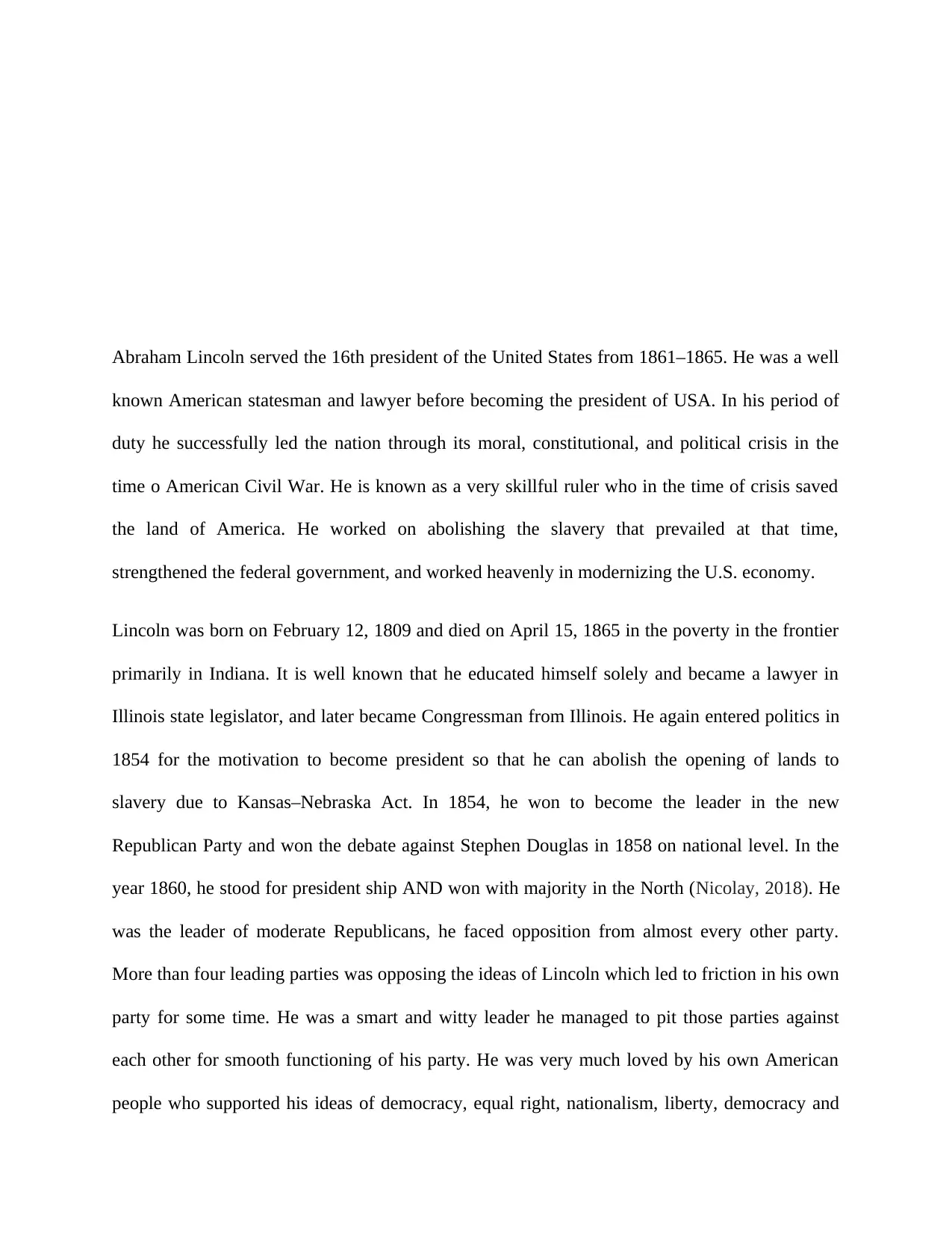
Abraham Lincoln served the 16th president of the United States from 1861–1865. He was a well
known American statesman and lawyer before becoming the president of USA. In his period of
duty he successfully led the nation through its moral, constitutional, and political crisis in the
time o American Civil War. He is known as a very skillful ruler who in the time of crisis saved
the land of America. He worked on abolishing the slavery that prevailed at that time,
strengthened the federal government, and worked heavenly in modernizing the U.S. economy.
Lincoln was born on February 12, 1809 and died on April 15, 1865 in the poverty in the frontier
primarily in Indiana. It is well known that he educated himself solely and became a lawyer in
Illinois state legislator, and later became Congressman from Illinois. He again entered politics in
1854 for the motivation to become president so that he can abolish the opening of lands to
slavery due to Kansas–Nebraska Act. In 1854, he won to become the leader in the new
Republican Party and won the debate against Stephen Douglas in 1858 on national level. In the
year 1860, he stood for president ship AND won with majority in the North (Nicolay, 2018). He
was the leader of moderate Republicans, he faced opposition from almost every other party.
More than four leading parties was opposing the ideas of Lincoln which led to friction in his own
party for some time. He was a smart and witty leader he managed to pit those parties against
each other for smooth functioning of his party. He was very much loved by his own American
people who supported his ideas of democracy, equal right, nationalism, liberty, democracy and
known American statesman and lawyer before becoming the president of USA. In his period of
duty he successfully led the nation through its moral, constitutional, and political crisis in the
time o American Civil War. He is known as a very skillful ruler who in the time of crisis saved
the land of America. He worked on abolishing the slavery that prevailed at that time,
strengthened the federal government, and worked heavenly in modernizing the U.S. economy.
Lincoln was born on February 12, 1809 and died on April 15, 1865 in the poverty in the frontier
primarily in Indiana. It is well known that he educated himself solely and became a lawyer in
Illinois state legislator, and later became Congressman from Illinois. He again entered politics in
1854 for the motivation to become president so that he can abolish the opening of lands to
slavery due to Kansas–Nebraska Act. In 1854, he won to become the leader in the new
Republican Party and won the debate against Stephen Douglas in 1858 on national level. In the
year 1860, he stood for president ship AND won with majority in the North (Nicolay, 2018). He
was the leader of moderate Republicans, he faced opposition from almost every other party.
More than four leading parties was opposing the ideas of Lincoln which led to friction in his own
party for some time. He was a smart and witty leader he managed to pit those parties against
each other for smooth functioning of his party. He was very much loved by his own American
people who supported his ideas of democracy, equal right, nationalism, liberty, democracy and
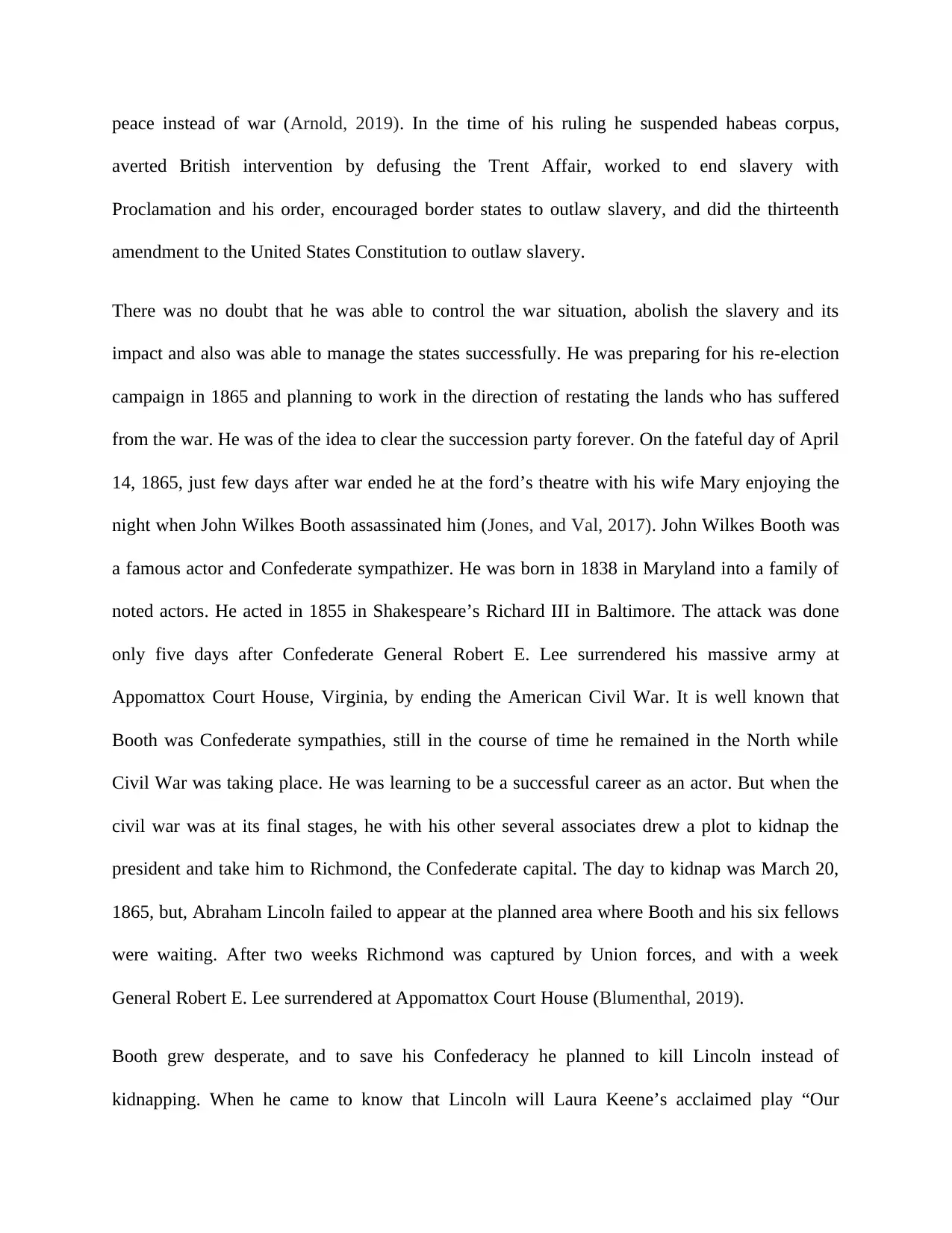
peace instead of war (Arnold, 2019). In the time of his ruling he suspended habeas corpus,
averted British intervention by defusing the Trent Affair, worked to end slavery with
Proclamation and his order, encouraged border states to outlaw slavery, and did the thirteenth
amendment to the United States Constitution to outlaw slavery.
There was no doubt that he was able to control the war situation, abolish the slavery and its
impact and also was able to manage the states successfully. He was preparing for his re-election
campaign in 1865 and planning to work in the direction of restating the lands who has suffered
from the war. He was of the idea to clear the succession party forever. On the fateful day of April
14, 1865, just few days after war ended he at the ford’s theatre with his wife Mary enjoying the
night when John Wilkes Booth assassinated him (Jones, and Val, 2017). John Wilkes Booth was
a famous actor and Confederate sympathizer. He was born in 1838 in Maryland into a family of
noted actors. He acted in 1855 in Shakespeare’s Richard III in Baltimore. The attack was done
only five days after Confederate General Robert E. Lee surrendered his massive army at
Appomattox Court House, Virginia, by ending the American Civil War. It is well known that
Booth was Confederate sympathies, still in the course of time he remained in the North while
Civil War was taking place. He was learning to be a successful career as an actor. But when the
civil war was at its final stages, he with his other several associates drew a plot to kidnap the
president and take him to Richmond, the Confederate capital. The day to kidnap was March 20,
1865, but, Abraham Lincoln failed to appear at the planned area where Booth and his six fellows
were waiting. After two weeks Richmond was captured by Union forces, and with a week
General Robert E. Lee surrendered at Appomattox Court House (Blumenthal, 2019).
Booth grew desperate, and to save his Confederacy he planned to kill Lincoln instead of
kidnapping. When he came to know that Lincoln will Laura Keene’s acclaimed play “Our
averted British intervention by defusing the Trent Affair, worked to end slavery with
Proclamation and his order, encouraged border states to outlaw slavery, and did the thirteenth
amendment to the United States Constitution to outlaw slavery.
There was no doubt that he was able to control the war situation, abolish the slavery and its
impact and also was able to manage the states successfully. He was preparing for his re-election
campaign in 1865 and planning to work in the direction of restating the lands who has suffered
from the war. He was of the idea to clear the succession party forever. On the fateful day of April
14, 1865, just few days after war ended he at the ford’s theatre with his wife Mary enjoying the
night when John Wilkes Booth assassinated him (Jones, and Val, 2017). John Wilkes Booth was
a famous actor and Confederate sympathizer. He was born in 1838 in Maryland into a family of
noted actors. He acted in 1855 in Shakespeare’s Richard III in Baltimore. The attack was done
only five days after Confederate General Robert E. Lee surrendered his massive army at
Appomattox Court House, Virginia, by ending the American Civil War. It is well known that
Booth was Confederate sympathies, still in the course of time he remained in the North while
Civil War was taking place. He was learning to be a successful career as an actor. But when the
civil war was at its final stages, he with his other several associates drew a plot to kidnap the
president and take him to Richmond, the Confederate capital. The day to kidnap was March 20,
1865, but, Abraham Lincoln failed to appear at the planned area where Booth and his six fellows
were waiting. After two weeks Richmond was captured by Union forces, and with a week
General Robert E. Lee surrendered at Appomattox Court House (Blumenthal, 2019).
Booth grew desperate, and to save his Confederacy he planned to kill Lincoln instead of
kidnapping. When he came to know that Lincoln will Laura Keene’s acclaimed play “Our
⊘ This is a preview!⊘
Do you want full access?
Subscribe today to unlock all pages.

Trusted by 1+ million students worldwide
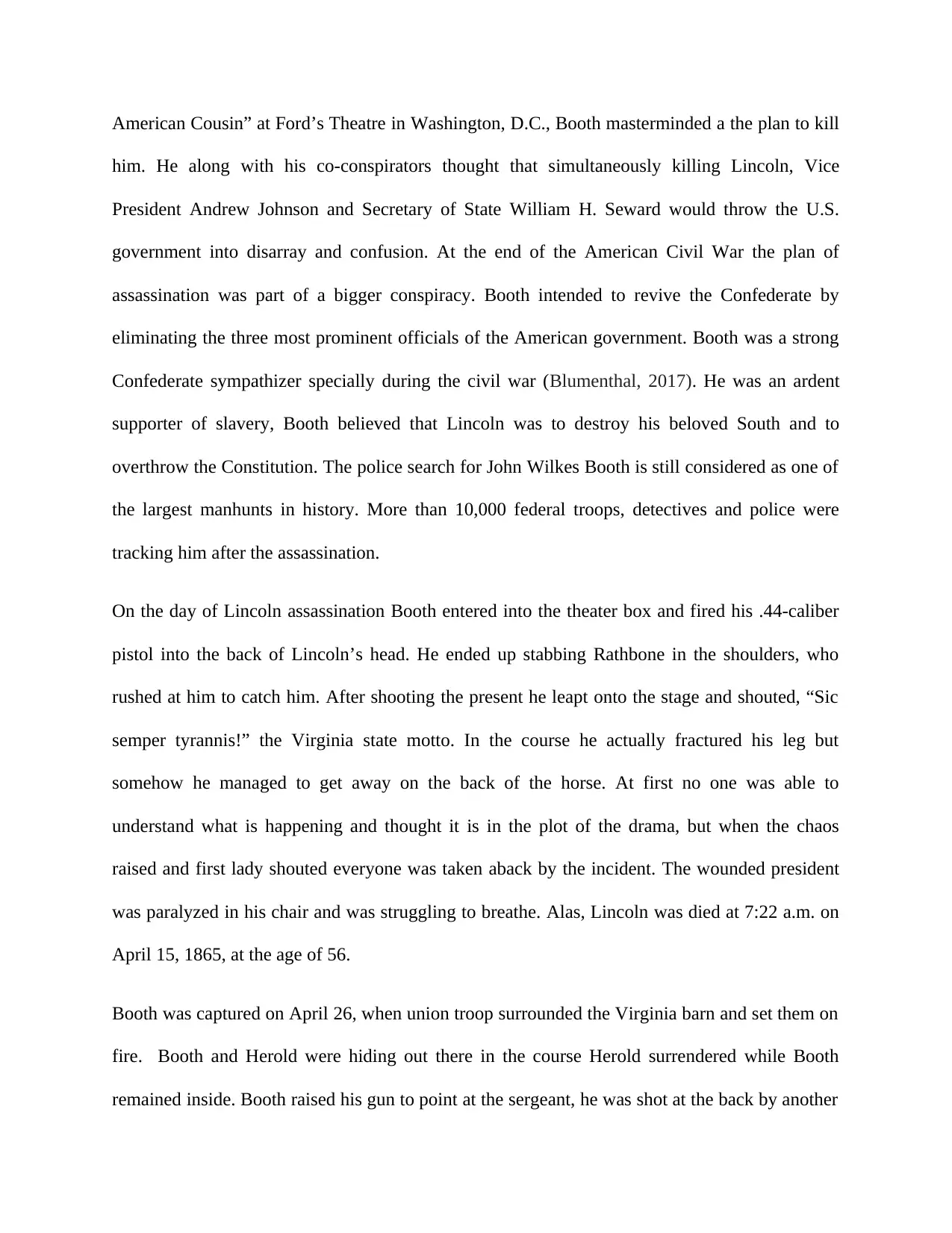
American Cousin” at Ford’s Theatre in Washington, D.C., Booth masterminded a the plan to kill
him. He along with his co-conspirators thought that simultaneously killing Lincoln, Vice
President Andrew Johnson and Secretary of State William H. Seward would throw the U.S.
government into disarray and confusion. At the end of the American Civil War the plan of
assassination was part of a bigger conspiracy. Booth intended to revive the Confederate by
eliminating the three most prominent officials of the American government. Booth was a strong
Confederate sympathizer specially during the civil war (Blumenthal, 2017). He was an ardent
supporter of slavery, Booth believed that Lincoln was to destroy his beloved South and to
overthrow the Constitution. The police search for John Wilkes Booth is still considered as one of
the largest manhunts in history. More than 10,000 federal troops, detectives and police were
tracking him after the assassination.
On the day of Lincoln assassination Booth entered into the theater box and fired his .44-caliber
pistol into the back of Lincoln’s head. He ended up stabbing Rathbone in the shoulders, who
rushed at him to catch him. After shooting the present he leapt onto the stage and shouted, “Sic
semper tyrannis!” the Virginia state motto. In the course he actually fractured his leg but
somehow he managed to get away on the back of the horse. At first no one was able to
understand what is happening and thought it is in the plot of the drama, but when the chaos
raised and first lady shouted everyone was taken aback by the incident. The wounded president
was paralyzed in his chair and was struggling to breathe. Alas, Lincoln was died at 7:22 a.m. on
April 15, 1865, at the age of 56.
Booth was captured on April 26, when union troop surrounded the Virginia barn and set them on
fire. Booth and Herold were hiding out there in the course Herold surrendered while Booth
remained inside. Booth raised his gun to point at the sergeant, he was shot at the back by another
him. He along with his co-conspirators thought that simultaneously killing Lincoln, Vice
President Andrew Johnson and Secretary of State William H. Seward would throw the U.S.
government into disarray and confusion. At the end of the American Civil War the plan of
assassination was part of a bigger conspiracy. Booth intended to revive the Confederate by
eliminating the three most prominent officials of the American government. Booth was a strong
Confederate sympathizer specially during the civil war (Blumenthal, 2017). He was an ardent
supporter of slavery, Booth believed that Lincoln was to destroy his beloved South and to
overthrow the Constitution. The police search for John Wilkes Booth is still considered as one of
the largest manhunts in history. More than 10,000 federal troops, detectives and police were
tracking him after the assassination.
On the day of Lincoln assassination Booth entered into the theater box and fired his .44-caliber
pistol into the back of Lincoln’s head. He ended up stabbing Rathbone in the shoulders, who
rushed at him to catch him. After shooting the present he leapt onto the stage and shouted, “Sic
semper tyrannis!” the Virginia state motto. In the course he actually fractured his leg but
somehow he managed to get away on the back of the horse. At first no one was able to
understand what is happening and thought it is in the plot of the drama, but when the chaos
raised and first lady shouted everyone was taken aback by the incident. The wounded president
was paralyzed in his chair and was struggling to breathe. Alas, Lincoln was died at 7:22 a.m. on
April 15, 1865, at the age of 56.
Booth was captured on April 26, when union troop surrounded the Virginia barn and set them on
fire. Booth and Herold were hiding out there in the course Herold surrendered while Booth
remained inside. Booth raised his gun to point at the sergeant, he was shot at the back by another
Paraphrase This Document
Need a fresh take? Get an instant paraphrase of this document with our AI Paraphraser
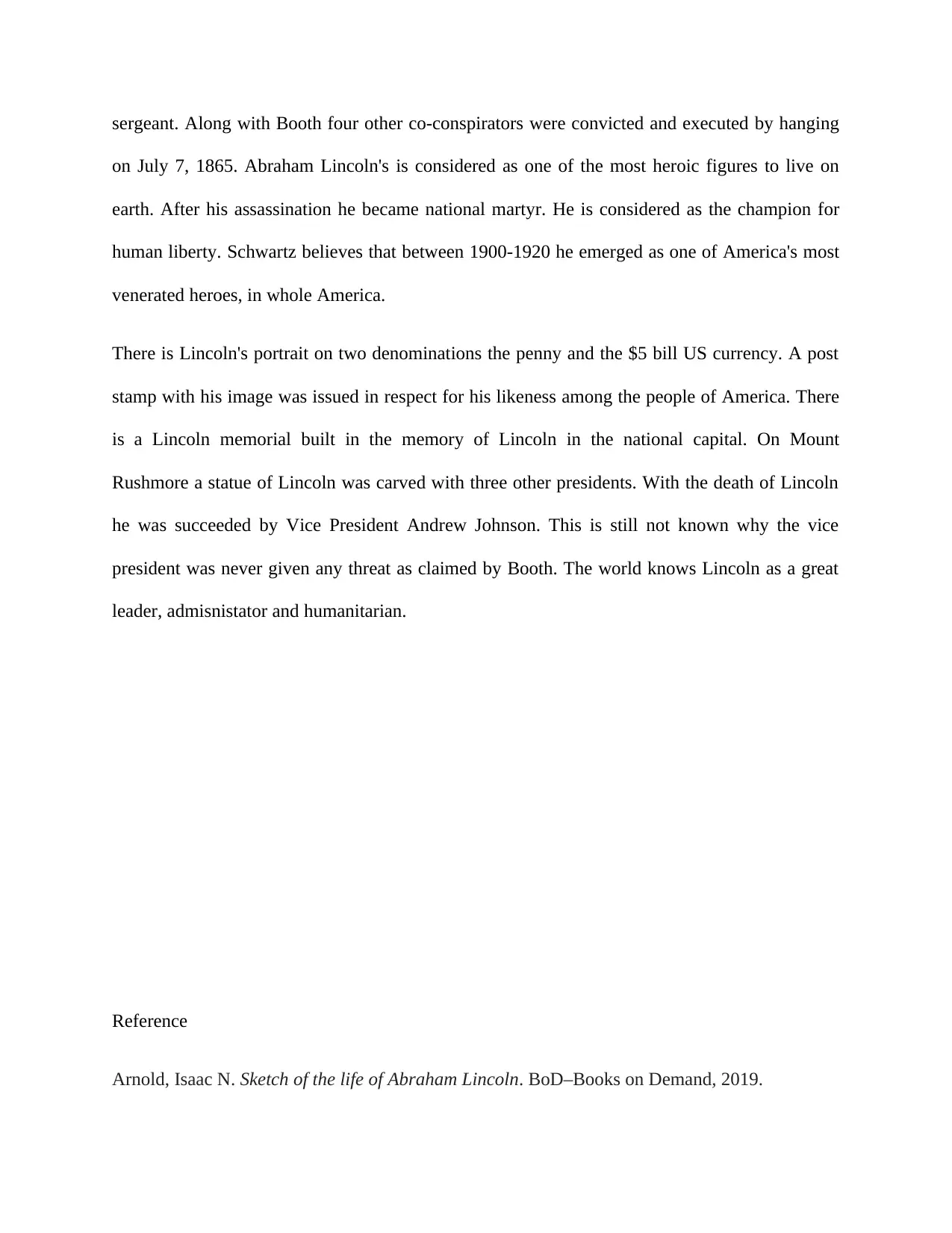
sergeant. Along with Booth four other co-conspirators were convicted and executed by hanging
on July 7, 1865. Abraham Lincoln's is considered as one of the most heroic figures to live on
earth. After his assassination he became national martyr. He is considered as the champion for
human liberty. Schwartz believes that between 1900-1920 he emerged as one of America's most
venerated heroes, in whole America.
There is Lincoln's portrait on two denominations the penny and the $5 bill US currency. A post
stamp with his image was issued in respect for his likeness among the people of America. There
is a Lincoln memorial built in the memory of Lincoln in the national capital. On Mount
Rushmore a statue of Lincoln was carved with three other presidents. With the death of Lincoln
he was succeeded by Vice President Andrew Johnson. This is still not known why the vice
president was never given any threat as claimed by Booth. The world knows Lincoln as a great
leader, admisnistator and humanitarian.
Reference
Arnold, Isaac N. Sketch of the life of Abraham Lincoln. BoD–Books on Demand, 2019.
on July 7, 1865. Abraham Lincoln's is considered as one of the most heroic figures to live on
earth. After his assassination he became national martyr. He is considered as the champion for
human liberty. Schwartz believes that between 1900-1920 he emerged as one of America's most
venerated heroes, in whole America.
There is Lincoln's portrait on two denominations the penny and the $5 bill US currency. A post
stamp with his image was issued in respect for his likeness among the people of America. There
is a Lincoln memorial built in the memory of Lincoln in the national capital. On Mount
Rushmore a statue of Lincoln was carved with three other presidents. With the death of Lincoln
he was succeeded by Vice President Andrew Johnson. This is still not known why the vice
president was never given any threat as claimed by Booth. The world knows Lincoln as a great
leader, admisnistator and humanitarian.
Reference
Arnold, Isaac N. Sketch of the life of Abraham Lincoln. BoD–Books on Demand, 2019.
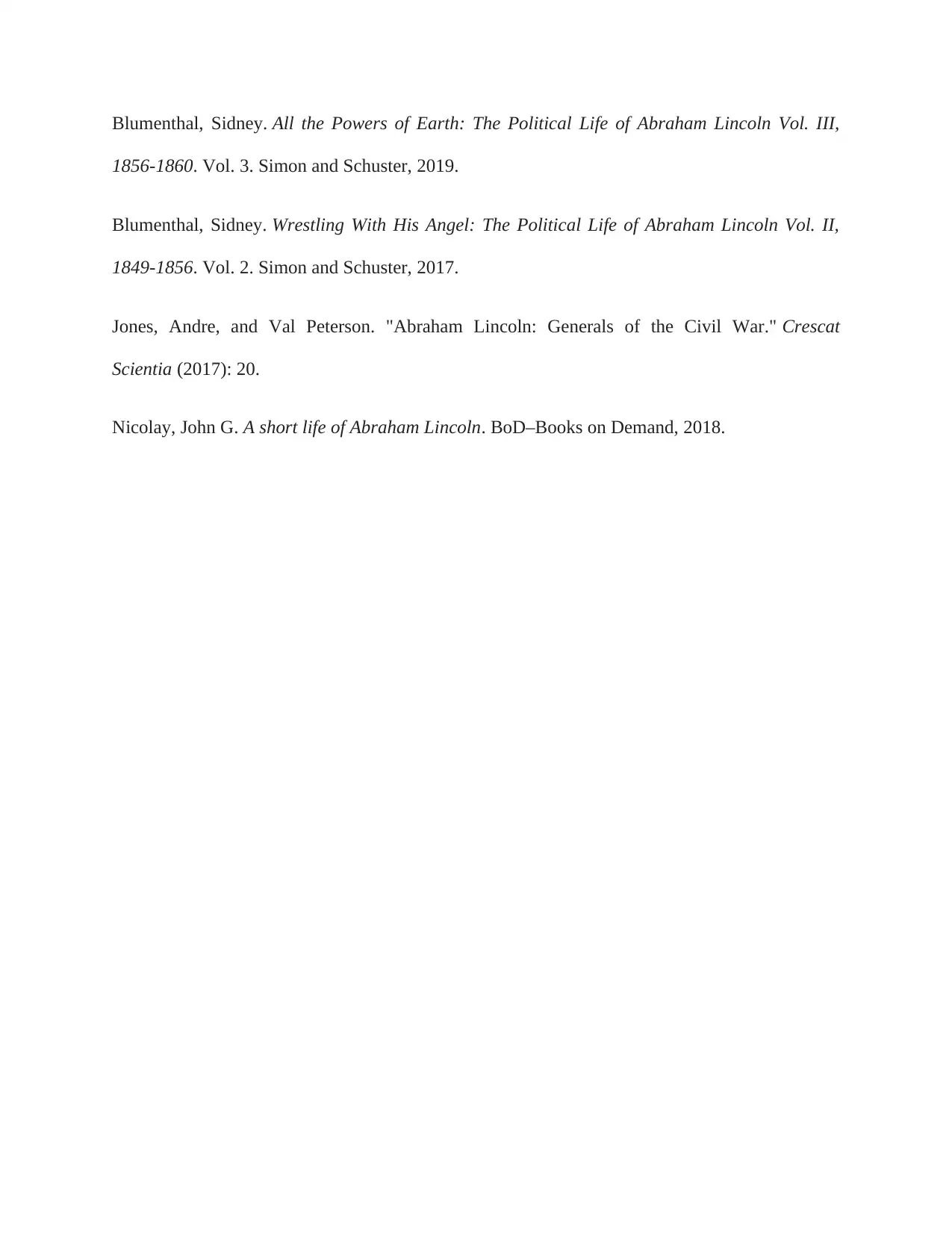
Blumenthal, Sidney. All the Powers of Earth: The Political Life of Abraham Lincoln Vol. III,
1856-1860. Vol. 3. Simon and Schuster, 2019.
Blumenthal, Sidney. Wrestling With His Angel: The Political Life of Abraham Lincoln Vol. II,
1849-1856. Vol. 2. Simon and Schuster, 2017.
Jones, Andre, and Val Peterson. "Abraham Lincoln: Generals of the Civil War." Crescat
Scientia (2017): 20.
Nicolay, John G. A short life of Abraham Lincoln. BoD–Books on Demand, 2018.
1856-1860. Vol. 3. Simon and Schuster, 2019.
Blumenthal, Sidney. Wrestling With His Angel: The Political Life of Abraham Lincoln Vol. II,
1849-1856. Vol. 2. Simon and Schuster, 2017.
Jones, Andre, and Val Peterson. "Abraham Lincoln: Generals of the Civil War." Crescat
Scientia (2017): 20.
Nicolay, John G. A short life of Abraham Lincoln. BoD–Books on Demand, 2018.
⊘ This is a preview!⊘
Do you want full access?
Subscribe today to unlock all pages.

Trusted by 1+ million students worldwide
1 out of 6
Related Documents
Your All-in-One AI-Powered Toolkit for Academic Success.
+13062052269
info@desklib.com
Available 24*7 on WhatsApp / Email
![[object Object]](/_next/static/media/star-bottom.7253800d.svg)
Unlock your academic potential
Copyright © 2020–2026 A2Z Services. All Rights Reserved. Developed and managed by ZUCOL.





